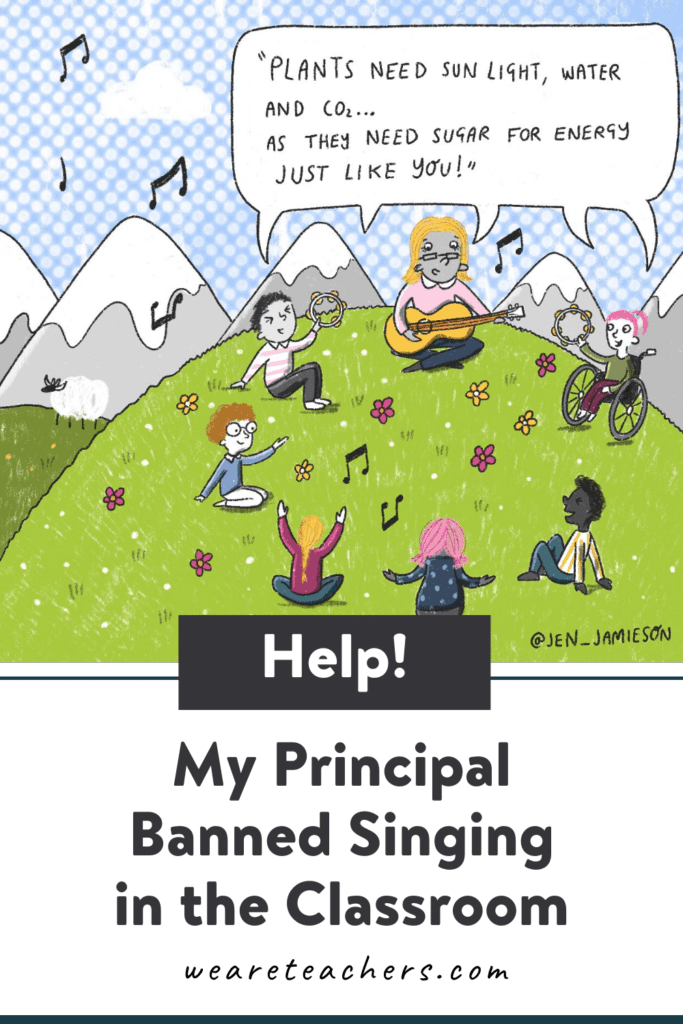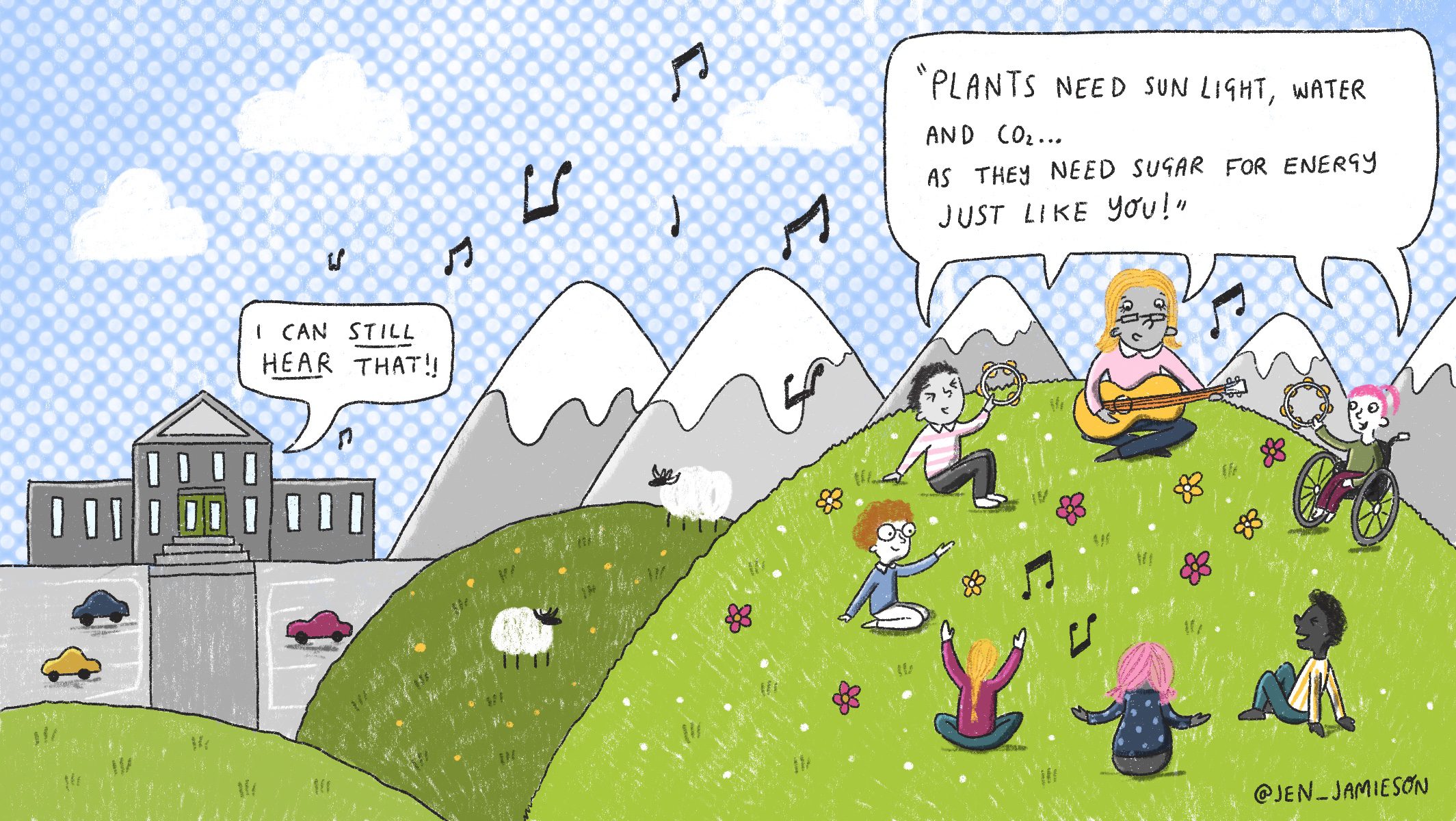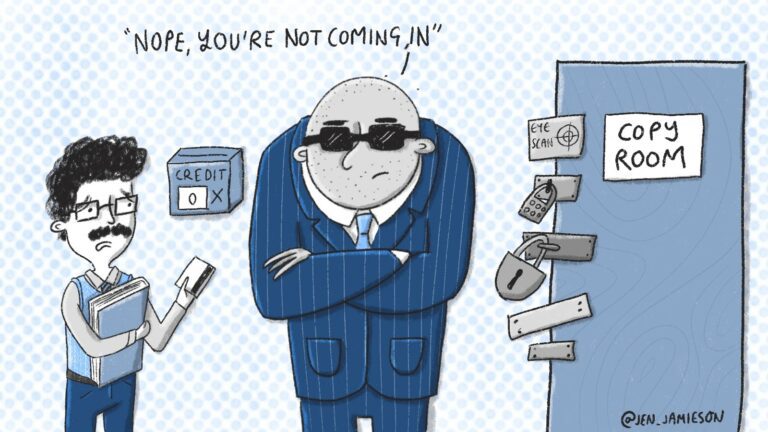Dear WeAreTeachers:
I teach fourth grade, and I love to have my students sing. My principal has questioned why we sing so many songs. He even commented that it’s a waste of precious instructional minutes. Our song time is one of the most vibrant times of the day. Not only does it build exciting and positing vibes, I know there are academic benefits, too. I feel like he’s squashing spirits! How do you handle upsetting feedback from a principal? Any tips on how music helps and doesn’t hurt? —Still Singing
Dear S.S.,
Music is a universal language. Hans Christian Andersen said, “Where words leave off, music begins.” That vibrancy that you are experiencing is powerful and absolutely nurtures a positive classroom community. When I taught 4th grade, we had a song and poetry notebook and now, almost 30 years later, former students reach out to me and say, “Remember this song?” There was a palpable feeling of joy and unity because of our songs. And the songs enabled rich discussions about words, time periods, artists, and relevant connections to their lives. When the students cleaned their desks the last week of school, the ONLY thing that was never thrown out was their song notebook!
To get started, it’s important to be proactive with your principal and communicate various ways songs help social, emotional, and academic realms in the classroom. You might say, “I’d love to talk to you more about ways that music adds value to the instructional day. I have many examples of how music promotes language development, reading fluency, meaning-making, creative expression, confidence, and joy in our classroom.” The following ideas will help will bolster your conversations with your principal, other colleagues, and families about how these musical minutes add value to the instructional day. Let’s unpack various reasons why music and singing together are so important in classrooms.
Music promotes reading development and meaning-making. I highly recommend giving students typed-out lyrics and creating a song notebook to formalize this component in your 4th-grade classroom. The song notebook enables students to build reading fluency as they reread the songs to themselves and others. You can also model how to annotate songs by circling new and important vocabulary or add sketches to promote meaning. The written songs are great tools for showing how language, works which is especially helpful for your multilingual learners.
Music builds language! Literacy experts agree that the reciprocity between speaking, listening, reading, writing, and thinking builds confidence, expression of ideas, and meaning for students. Listening comprehension far outpaces reading comprehension and songs promote this. Singing songs has an added benefit for the variability of your students’ language development. Children more readily learn vocabulary for ideas that interest them. They learn best with high levels of active engagement. Use your songs to showcase a wide range of vocabulary and language structures.
Use your songs as discussion springboards. Engaging in meaningful talks about what they notice and wonder related to the songs promotes relevance and personal connections. For a deep discussion on the Civil Rights Movement and justice in the United States, sing and discuss the song, “Lift Every Voice and Sing”. This song was highlighted during the 2020 NFL Superbowl, and the words and video draw students and spark conversations about prejudice, human rights, and American history. Songs are also great for engaging in authentic research about the historical context, artist, and ways songs are an important thread in activism.
I hope your classroom is singing right now! When children sing and make meaning of songs together, they learn about themselves, each other, and the world. Music is a way to use your instructional minutes wisely.
Dear WeAreTeachers:
I had a father come storming into my classroom. I’m not sure how he got past the office without being stopped. He was super upset because his daughter didn’t get her Pizza Hut Book-It coupon. She didn’t get it because she didn’t meet the reading goal that I set. The dad told me I was expecting too much from her because she had dance and drama classes in the evenings, and it was just way too much reading to do. He told me he was going to the superintendent about it. I was so angry! I told him to go right ahead, that the superintendent didn’t set the reading goals for my classroom. Any advice on what else I should do? —Standing My Ground
Dear S.M.G.,
So many of us have had angry parents cross our paths. And this sounds like a jolting experience for sure! Hopefully, you were able to talk to your site administrator about the lapse in safety protocols. That’s a real concern and should not happen again. I’d ask my principal to talk to the parent about the safety procedures on campus. When highly reactive interactions with families occur, it’s critical to document what happened and what was said. It’s likely you will be asked to provide this information when you do meet with your leadership.
For future meetings with either or both of the parents, invite your administrator or another colleague to be present with you for support. It’s important to have someone bear witness to the intense emotions that may be sparked. There are some parent communication mistakes to avoid as you interact with all caregivers. One idea to remember is not to take the parent’s anger too personally. Instead, try and reframe and deescalate family interactions by asking, “What can we do together to ensure that your child does well?”
This dad sounds like an example of what we know as helicopter parents. Amy Morin, LCSW, describes a helicopter parent as someone “who pays extremely close attention to their kids’ activities and schoolwork in an effort to not only protect them from pain and disappointment but to help them succeed. Helicopter parents are known to hover over their children and become overly involved in their lives.”
Why is helicopter parenting detrimental to kids? When parents have these extreme overprotective tendencies, they are sending messages that they don’t believe their children are good problem solvers. How else will kids learn how to be good problem solvers if their parents are removing obstacles and logical consequences? In their efforts to protect and avoid disappointment for their children, they rob them of the gift of learning from their own mistakes and building self-efficacy. Interestingly, helicopter parents often overschedule their kids, which may be what’s happening with your student and their family.
Hopefully, you reinforced the expectations for the reading goals with the whole class. Providing class time for the students to reflect on what they did well with this reading challenge and what they will do differently next time is important. Promoting student reflection involves the kids more in the learning and goal-setting process and helps build student agency. Kids need to learn how to be successful in setting goals and realizing that their thoughts and actions help them attain these goals.
As your school year continues to unfold consider the effects of reading incentive programs. It’s understandable that you want to take advance of the pizza coupon and also it’s critical to remember that “reading is rewarding when there’s no reward for reading.”
Dear WeAreTeachers:
I am so embarrassed and not sure what to do. I have no idea how to teach math. Unfortunately, I’m at a disadvantage even more because I am teaching 6th grade. Sometimes I find myself looking at a math example for hours and still can’t explain how they created the model. Maybe it’s time for me to ask for a grade change or quit altogether. How can I get over this major challenge? — Help Me Love Math
Dear H.M.L.M,
So many of us struggle with building our confidence as teachers in one content area or another. Imposter syndrome is widespread in many fields and is alive and well with teachers, too. You are not alone in your feelings of wobbliness related to teaching math.
Recognizing an area of growth is the first step to improving! I’m sure you are aware of the power of catalyzing a growth mindset with your students. The same goes for you! Einstein said, “It’s not that I’m so smart. It’s that I stay with problems longer.” So, don’t give up. Stick with it and let’s consider some ways to make you love math a little bit more.
Ask yourself, what makes you feel like math is a struggle? Take some time to reflect on your prior math experiences throughout your life. How do you feel about math? Why? Maybe someone said things like “Math just isn’t your thing,” or you grew up believing you aren’t good in math. Many of us have experienced some level of trauma around learning math. Some examples might include feeling panicked about timed math tests or getting stuck and not asking for help. Many teachers struggle to teach math. And about 40% of students think they are just not good at math.
Building your own capacity in math is an important step to take. Jo Boaler, creator of the widely visited youcubed website, provides inspiration to most things related to math teaching and learning. She says a “misconception about mathematics that is pervasive and damaging—and wrong—is the idea that people who can do math are the smartest or cleverest people. This makes math failure particularly crushing for students, as they interpret it as meaning that they are not smart.” There is no reason to feel embarrassed. The balm to embarrassment is empowerment. Start learning about some creative, engaging, and effective ways to teach and learn math.
Many educators sing the of Khan Academy for helping to build understanding around specific math concepts before you teach them. Yes, it will take some extra effort on your behalf to build your knowledge, but it’s worth it to feel more prepared and effective. Another way to build your comfort level is to work with a colleague and ask the approach they are taking to teaching a concept that feels murky to you.
If, after building your capacity with math and working on your own mindset, you decide that a grade or career change feels like the right thing to do, that’s OK, too.
Dear WeAreTeachers:
My student hums all day. I’m not even sure if he realizes he’s doing it. I’m wondering about other ideas for him to blow off steam. I teach in a 1st-grade classroom with a diverse population of students. It’s so hard to juggle all the individual needs of the students and still do my best with the class as a whole. The humming is distracting to some of the kids. Often, I let him be during our collaborative work time, but when I’m doing some direct teaching, it’s really distracting. What can I do? —Hoping for Hush
Dear H.F.H.,
Thank you for sharing this issue that you are experiencing in your classroom. We all have had students that exhibit behaviors that may distract from other people’s learning. Humming sounds harmless, but it does need to be addressed (in a compassionate way). Often, repeated behaviors like humming help to calm or maintain emotional stability during times of stress, anger, confusion, fear, or boredom.
The first thing to do is gather some more information about your little hummer. Talk to your student’s parents to find out if the humming is something new and if their child does this at home, too. If possible, talk to last year’s teacher to learn if the student was a hummer then and how they handled it.
Have you talked to the student yet? Consider having a one-on-one conversation about what’s going on. It’s possible your student isn’t yet aware of their humming. Ask your student how they are feeling lately. Specifically inquire about how they feel about school, your class, and the other students, too.
Gently share that you notice they hum during class. Show the student what the humming sounds like and ask if they noticed they are doing that. Discuss how there are times in school that it’s just fine to hum and other times when it’s distracting to others and makes students have a hard time focusing on their learning. Try and make this an opportunity for self-awareness versus a disciplinary talk. Come up with a non-verbal cue that you will use when you hear the student humming so they can learn to self-regulate in class.
Reflect on the classroom culture that exists in your classroom. Is there any room for improvement around building compassionate classroom community members? When tackling sensitive behavior issues, a little compassion goes a long way. Remember that behavior has meaning and it’s possible that your student is dealing with some form of anxiety.
There are ways to help students who struggle with anxiety. Breathing is a well-known technique that has powerful and immediate effects. Guiding students on some breathwork is a tool that is always there for you. One easy breath to model and practice with your students is a “drop breath.” Squeeze your shoulders up to your ears and inhale and hold. Drop your shoulders and exhale. Repeat! Another technique that is gaining more and more popularity is called tapping. This meditative approach is helping many students and teachers learn a life skill to build self-awareness and slow down to feel a sense of calm.
Teaching takes patience, knowledge, reflection, and lots of experimentation. Hopefully, over time and with your gentle support, your student will improve and what you’ll hear in your classroom will be the productive buzzing sound of joyful, engaged, collaborative and focused kids.
Do you have a burning question? Email us at askweareteachers@weareteachers.com.
Dear WeAreTeachers:
I’m so upset. We were just told we are only allowed 150 copies per month. That’s all. 150 pages for copies. And they count front and back as two copies. So now I’m going to have to go to Kinkos and make my own copies. Keep in mind that my county wouldn’t pay for textbooks for their state dual credit class. So I copied the entire textbook to help them pass their test. Now that’s well over my limit. Seriously. How am I supposed to do this job with all these crazy limitations?
Illustration: Jennifer Jamieson


